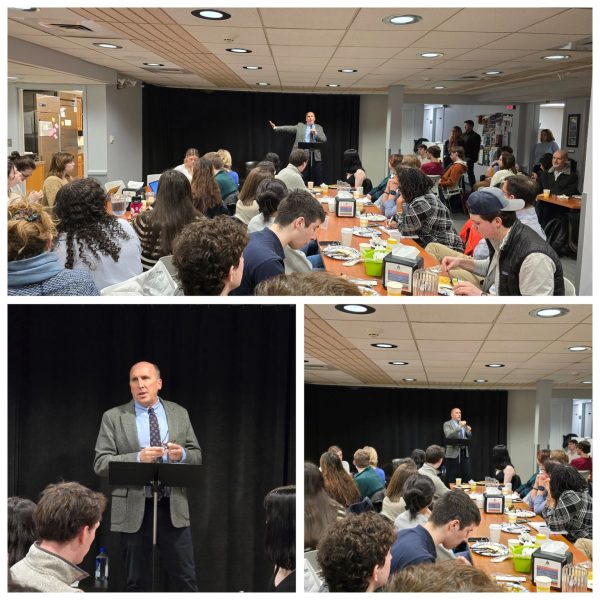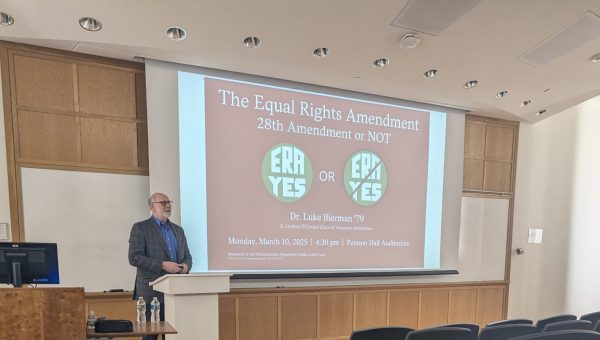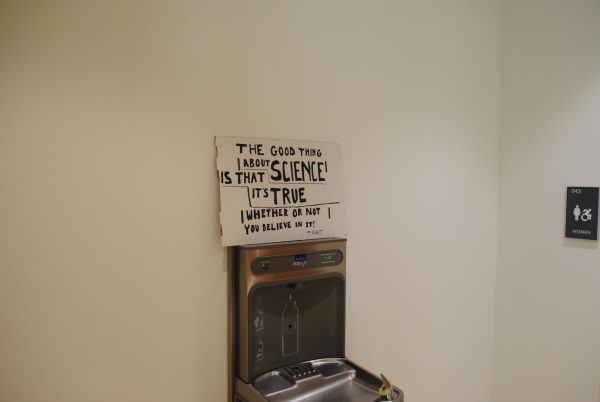Colgate Students Discuss their Conceptions of Climate at the 2017 Lewis Orator Competition
On Thursday, February 9, the Lewis Orator Competition was held in Persson Hall auditorium. The Harry C. Behler Debate Society of Colgate University hosted the event.
Professor John James Lewis established the competition on August 6, 1867 as a way to honor the memory of his brother, George W. M. Lewis of Utica, NY. The original event granted a $1,000 gift. Lewis was admired and well-respected amongst colleagues. He taught English literature, civil history and oratory classes until he passed away in 1884. Lewis was known for his cheerful nature, passion and extensive literary and social tastes. This competition has thus been a long-standing and distinguished tradition.
President of the Debate Society, senior Daniel Messner, began by welcoming everyone, thanking the judges for their time, stating the rules and introducing the competitors.
There were six competitors in total – senior Lorelai Avram, senior P.J. Benasillo, sophomore Rohan Chadhauri, first-year Diana Flores, senior Caroline Kielar and sophomore Oneida Shushe.
The contestants signed up by contacting the Debate Society’s On Campus Events Coordinator (OCEC). Registration consisted of an email submission of a speech outline including its title, the contestant’s name, campus address, student I.D. number and an agreement statement.
The judges were Office Manager of the Center for Leadership & Involvement Denise Upton and Colgate alumnus Ethan Bennett ‘06. Each judge was provided a criteria sheet upon which they graded on a scale of one to five (one being weak, five being exceptional), totaling the scores based on several characteristics. They judged the contestants according to six categories – adaptation, organization, development, delivery, style and distinctiveness.
Messner stated that the speeches must be between five and seven minutes long, and speeches less than five minutes or over seven and a half minutes would receive a three-point penalty. He also advised that speeches should not be memorized or completely impromptu.
Contestants of the Lewis Orator Competition are asked to prepare a short, original speech based on a single word that has been chosen ahead of time. The prompt given for this year’s contest was “climate.” On the Colgate debate website, the guidelines for the Lewis Orator Competition explain that the one-word prompt “must be used in the speech as a vehicle to elucidate some aspect of social reality in a new and memorable way.” The three highest scoring speeches are awarded cash prizes determined for the ranks in the given year, and the first-place speaker’s name is also engraved on the Lewis Prize plaque.
This year, first place went to Benasillo for his speech titled “Don’t be S.A.D,” which concerned personal struggle with seasonal affective disorder and Colgate’s mental health initiatives. He advocated for improvements within the counseling center and encouraged students struggling with mental difficulties to come forward.
Kielar received second place with her speech “Climate Change: Protecting the Iceberg of Self Care.” Kielar’s speech began with the iconic image of a polar bear teetering on a small iceberg as a metaphor for the daily pressures students are subject to.
Third place went to Avram with her speech “Don’t Focus on the Weather; Consider the Climate as Well.” Avram poetically conveyed the similarities between climate and emotions.





